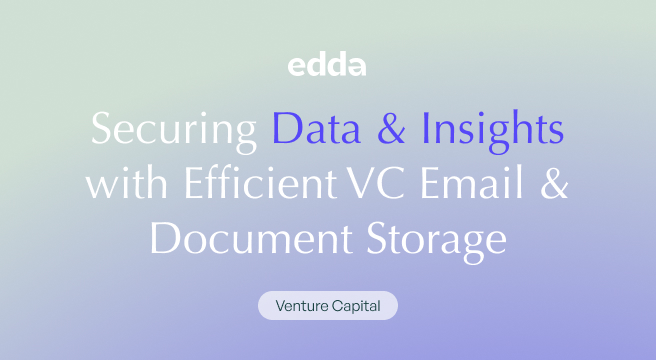Venture capital organizations understand the importance of efficient document management for the success of their firm. Poor document management can cause major setbacks, missed opportunities, and legal risks.
Implementing effective document management tools and processes can help you manage the growing volume of emails and documents, streamline workflows, and ensure compliance with regulatory requirements.
In this article, we will explore the benefits of implementing effective document management tools and processes, and how they can give your firm the competitive edge it needs to thrive. In addition, learn how Edda’s venture capital portfolio management software can help.
Data Overload & Mismanagement
With the influx of vast amounts of data, including emails, reports, and legal documents, VC and PE firms often struggle to organize and manage this information effectively. The inability to quickly retrieve necessary documents or emails can lead to delays in decision-making, potentially missing critical investment opportunities.
The key lies in streamlining and optimizing data management practices.
Data Management Systems
Central to addressing this challenge is the implementation of advanced data management systems.
These venture capital software tools offer advanced search, categorization, and indexing features, essential for quick retrieval of information in a dynamic investment environment. They effectively address inefficiencies like time-consuming document retrieval and version control issues. By ensuring easy access to the latest versions of documents, these systems aid in maintaining consistency in strategies and decisions, reducing the likelihood of errors due to outdated information.
Cloud-based Storage
The scalability and flexibility offered by cloud-based storage are indispensable for firms managing growing data volumes and working remotely. These solutions directly address the challenges in remote access, ensuring secure and efficient document and email accessibility from various locations.
Email Management
Email management, often a significant source of data overload, can be efficiently handled through automation. Utilizing tools that categorize and prioritize emails helps in managing the influx of communications and ensures that critical emails are attended to promptly. This approach not only streamlines email management but also supports efficient collaboration and communication within the firm and with external stakeholders.
Regular Data Handling Training
However, technology alone isn’t the complete solution. Regular training of staff in data management best practices is equally important. When team members understand the importance of proper data organization and are proficient in using management tools, data handling becomes more disciplined and effective. This training is also key to preventing resource drain on IT and administrative tasks, as well-trained employees can independently manage and organize data more efficiently.
Integration
Integrating CRM systems, document management software, and email platforms ensures smooth information flow across different operational areas. This integration is vital in reducing data silos, enhancing collaboration, and ensuring that all team members have access to the information they need for informed decision-making.
Security Vulnerabilities
Venture capital and private equity firms face substantial risks due to security vulnerabilities in their data management systems. Handling sensitive data about investments, clients, and strategic plans, firms can suffer severe consequences if their email and document storage systems are compromised. Inadequate security can lead to unauthorized access, potentially causing legal, financial, and reputational damage.
The repercussions of a data breach are extensive. Legal actions and financial penalties due to non-compliance with data protection laws can strain a firm’s resources. Moreover, a breach can erode investor trust, leading to a withdrawal of investments and difficulty in securing future funding. The long-term impact on the firm’s reputation might hinder business prospects, severely affecting market standing.
To fortify against these risks, VC and PE firms need to adopt a multifaceted approach to security:
- Enhanced Data Protection: Implement advanced encryption for data at rest and in transit. This measure ensures that sensitive information is shielded from unauthorized access.
- Stringent Access Control: Establish robust access controls based on employee roles. This approach restricts access to sensitive data, significantly reducing the risk of internal breaches.
- Proactive Security Measures: Regularly conducting security audits and compliance checks helps in identifying and addressing vulnerabilities promptly. Keeping up-to-date with data protection laws is also crucial to mitigate legal risks.
- Employee Vigilance: Training staff on data security best practices is vital. Educating them about potential threats and the importance of adhering to security protocols can reduce the risk of breaches due to human error.
- Advanced Security Systems: Utilizing systems that detect and prevent unauthorized access or anomalies in data handling offers an additional layer of protection.
Compliance & Regulatory Challenges
VC and PE firms are subject to stringent regulatory requirements regarding data handling and privacy. Challenges in maintaining compliant document storage and retrieval systems can result in legal penalties, tarnishing the firm’s reputation and leading to investor distrust.
As previously mentioned, implementing sophisticated document management systems with robust security and training employees regularly on data handling can also reinforce regulatory adherence and reduce the risk of inadvertent non-compliant actions.
Built-in Compliance Features
Utilizing document management systems that come with built-in compliance features can greatly simplify adherence to regulations. These systems should be designed to facilitate not only secure storage but also compliant sharing and retrieval of documents, complete with necessary audit trails and access controls.
Comprehensive Compliance Framework
A comprehensive compliance framework that aligns with current data protection laws is the cornerstone of this approach. This framework should encompass all facets of data management, ensuring that every process, from storage to retrieval, adheres to regulatory standards. Regular compliance audits are instrumental in this context, helping firms stay abreast of evolving regulations and identify potential areas of risk.
Enhancing Data & Document Management with Venture Portfolio Management Tools
When it comes to securing data and insights for VC and PE firms, Edda’s venture capital management software offers a transformative solution to the challenges of email and document storage. Its comprehensive suite, encompassing over $30 billion in assets across a global clientele, streamlines the management of vast and diverse datasets. Edda’s platform excels in organizing and facilitating access to critical investment documents and correspondence, addressing the common pain points of data overload and mismanagement.
Edda’s integration with essential communication tools like email plugins for Outlook and Gmail simplifies the consolidation of information, ensuring a seamless flow of communication. The software’s robust data management capabilities, fortified by enterprise-grade security (SOC2 compliant), provide a secure and efficient environment for handling sensitive investment data and documents.
This not only mitigates security risks and compliance challenges but also enhances operational efficiency, allowing VC and PE firms to focus on strategic decision-making and investor relations. By adopting Edda’s advanced venture capital software, firms can effectively navigate the complexities of data management and maintain their competitive edge.



